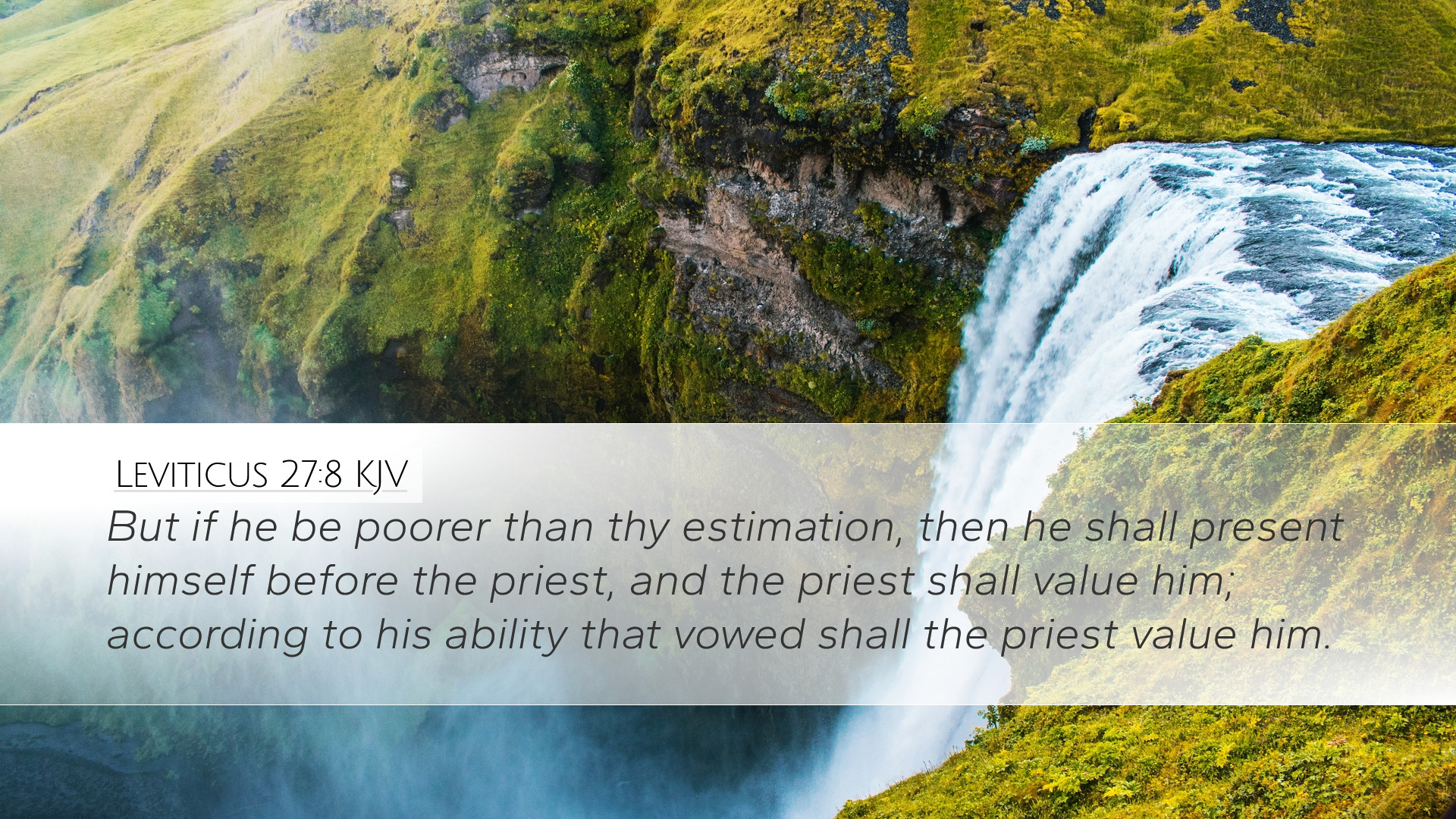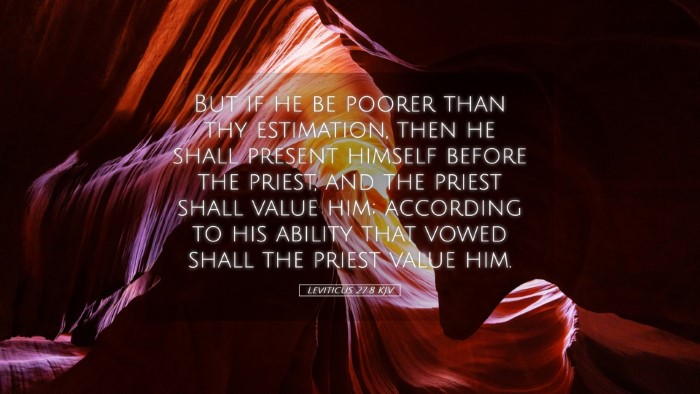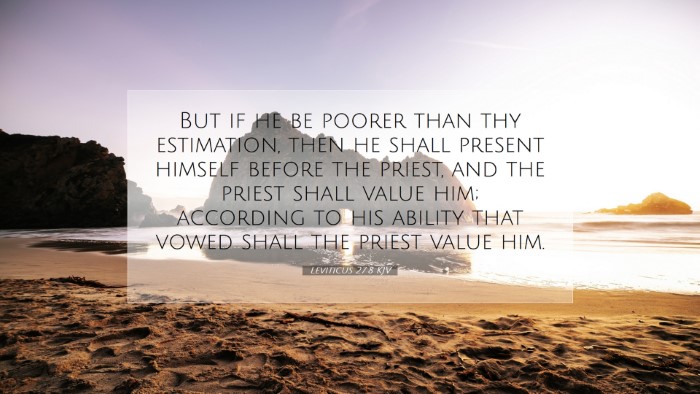Commentary on Leviticus 27:8
Verse Context: Leviticus 27:8 states:
"But if he is too poor to pay your valuation, then he must present himself before the priest, and the priest shall assess him; according to what the vower can afford, the priest shall evaluate him."
Introduction
This verse falls within a larger context of laws regarding vows and dedications made to God. It addresses the social and economic aspects of such vows, involving community welfare and the mercy of the institution of the priesthood.
Insights from Public Domain Commentaries
Matthew Henry
Matthew Henry emphasizes the importance of mercy in the valuation process. He notes that although a person may have made a vow that comes with a significant cost, the community (and the priest as its representative) must account for the individual's financial position.
- Human Limitations: Henry insists that the human condition is marked by various limitations, including poverty, which should invoke compassion rather than strict justice.
- Priestly Role: He highlights the priest's role as a mediator who not only upholds the law but also extends grace, recognizing that the valuation of an individual should reflect their circumstances.
- Affordability: The mention of "what the vower can afford" shows that God acknowledges different financial realities; thus, spiritual obligations should not lead to severe hardship.
Albert Barnes
Albert Barnes provides additional insights into the nature of vows and their significance in Israelite culture. He explores the responsibility of individuals making vows and stresses the importance of intention over mere obligation.
- Value Assessment: Barnes points out that the priest's evaluation serves to maintain a balance between the vow's original intent and the reality of the individual's ability to fulfill it.
- Community Support: He argues that the system in place was designed to foster a supportive community where the priest could encourage and uplift those who genuinely sought to dedicate themselves to God, regardless of financial capacity.
- Spiritual Meaning: The act of dedication itself is fundamental; the monetary value is secondary to one's willingness to commit to God’s service.
Adam Clarke
Adam Clarke focuses on the procedural aspects within the Mosaic Law and provides an analytical approach to understanding this verse. He elaborates on the implications of dedicating something valuable to God and the ramifications of being unable to meet such a vow.
- Legal Framework: Clarke notes that this law serves as a safeguard for the poor, ensuring they are not unfairly burdened by their vows, creating an avenue of relief through the priest's mediation.
- Divine Assessment: He interprets the assessment process as rooted in God’s justice, where divine principles govern how humans interact, particularly in community settings.
- Assurance of Accessibility: Clarke conveys the message that God's requirements are not inflexible; they adapt to the abilities of individuals, reinforcing the belief that God desires genuine participation over ritualistic exactitude.
Theological Implications
The passage illustrates a profound principle within biblical theology: that God's expectations are tailored to the capacity of His people. The application of this verse extends beyond the Old Testament mosaic laws into the core of Christian life, where grace and mercy take precedence over legalism.
- Grace in Vows: The manner in which vows are handled shows an inclination towards grace. Just as God considers the heart and situation of the giver, modern believers are encouraged to approach commitments with an understanding of each person's circumstances.
- Justice and Charity: This text defines a harmonious relationship between justice and charity, indicating that God's justice is not punitive but rather restorative. Pastors and theologians are reminded to preach a balance of accountability and compassion.
- Community in Worship: The communal aspect of vows reminds believers that worship is not solely an individual act but inherently relates to the broader community, where mutual support and understanding prevail.
Application for Ministry and Scholarship
Leviticus 27:8 holds a significant place in pastoral ministry and academic reflection. For pastors, it serves as a reminder that church regulations and expectations should never overshadow the individual circumstances of the congregants. For students and scholars, this text offers rich grounds for exegesis and socio-economic reflections on ancient practices and their modern-day parallels.
Pastoral Application
Ministers can glean the importance of pastoral care from this verse. Emphasizing sensitivity to congregational realities can lead to healthier church environments where burdens are shared, and grace is experienced.
Scholarly Reflection
From a scholarly perspective, the economic implications of this verse can provoke discussions on how ancient Israelite society balanced religious obligations with social welfare. Professors could introduce this text in discussions surrounding Social Justice in biblical contexts.
Conclusion
Leviticus 27:8 is a rich verse laden with theological depth and practical significance. By understanding the nuances within the laws and the heart of God depicted through them, believers are invited into a deeper engagement with their faith, ensuring that their commitments to God reflect both intention and integrity. This balance of obligation with grace lays a profound foundation for future theological discourse, pastoral practice, and individual faith journeys.


